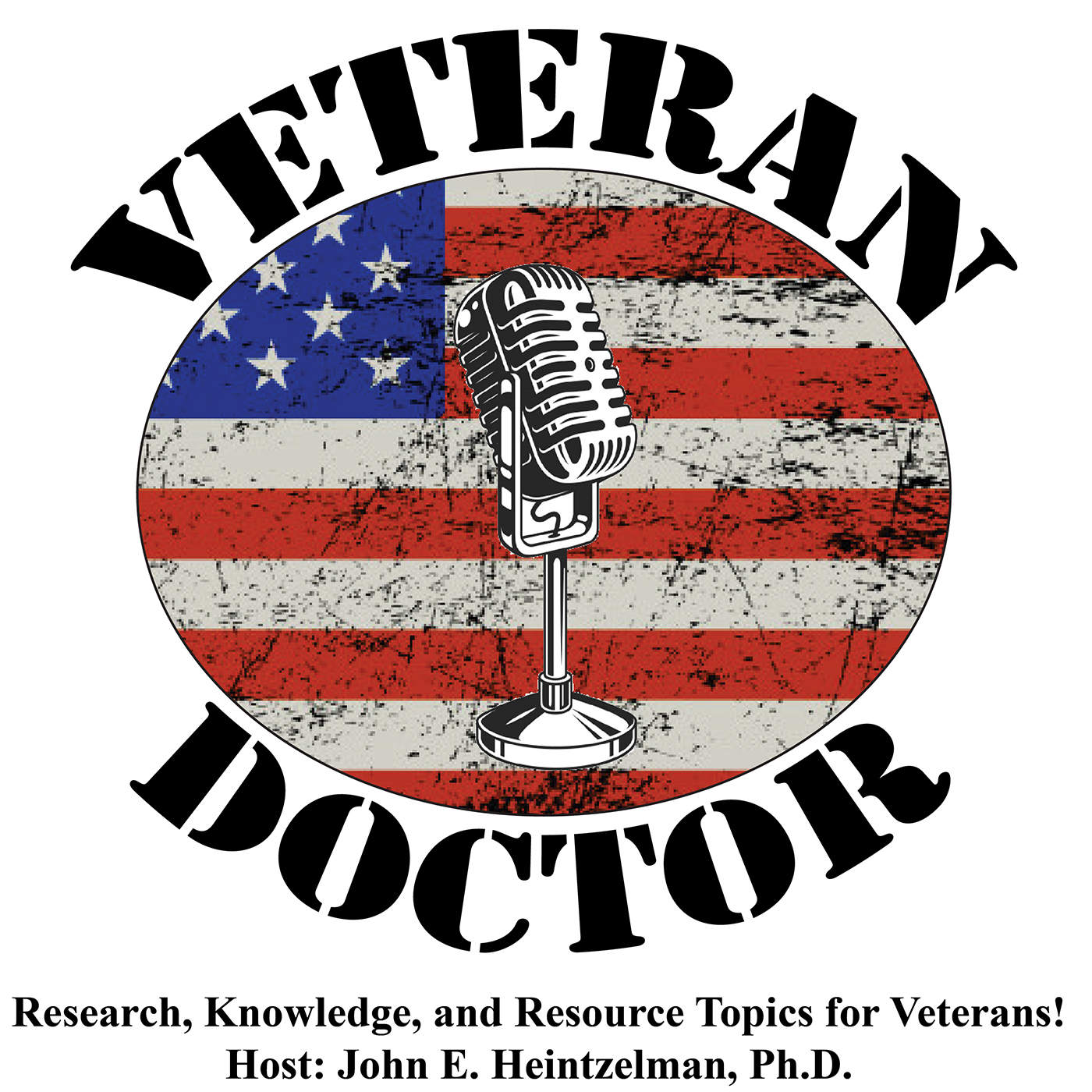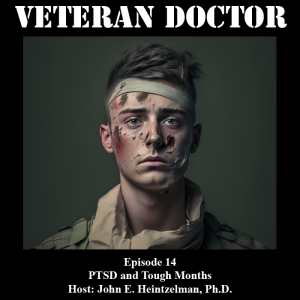
1.7K
Downloads
40
Episodes
This podcast is for anyone interested in Veteran-centric topics. Veterans have dedicated their lives to serving our country, so now it is our turn to serve them as they transition back into their civilian lives. One thing that has been discovered is that there is a lack of knowledge on the availability of resources and how to properly navigate the system upon exiting military service. This podcast's purpose is to help fill this gap of knowledge and guide veterans to the resources and information that they so deserve.
Episodes

Sunday Mar 07, 2021
Veteran Doctor - Episode 14 - PTSD and Tough Months.
Sunday Mar 07, 2021
Sunday Mar 07, 2021
Good Morning Veterans, Family, and Friends, welcome back to the FOURTEENTH EPISODE of the Veteran Doctor. On this week's podcast, we will discuss PTSD and Tough Months. We will also continue our fun facts of UBI (Useful Bits of Information) and Veteran News, so stick around for the program!
Different times of the year become very busy for many people, but for many veterans this can cause tough times when many barriers develop with many different obstacles like Post Traumatic Stress Disorder. Many people have limited knowledge on this issue, except for what the media portrays it as, which is virtually untrue. Here are some facts to educate you on this disorder that challenges many veterans and can give you some knowledge to help these veterans in many ways.
Understanding PTSD in veterans
Many veterans have a hard time readjusting to life outside of the military. Many always feel on edge, emotionally numb and disconnected, or close to panicking or exploding. For all too many veterans, these are common experiences—lingering symptoms of post-traumatic stress disorder (PTSD). It’s hard living with untreated PTSD and, with long Veterans Affairs (VA) wait times, it’s easy to get discouraged. But many can feel better and get started today, even while waiting for professional treatment, by being proactive and educating themselves on the disorder itself and things to help relieve symptoms.
What causes PTSD?
Post-traumatic stress disorder (PTSD), sometimes known as shell shock or combat stress, occurs after you experience severe trauma or a life-threatening event. It’s normal for a veteran’s mind and body to be in shock after such an event, but this normal response becomes PTSD when their nervous system gets “stuck.”
A Veterans nervous system has two automatic or reflexive ways of responding to stressful events:
Mobilization, or fight-or-flight, occurs when you need to defend yourself or survive the danger of a combat situation. Your heart pounds faster, your blood pressure rises, and your muscles tighten, increasing your strength and reaction speed. Once the danger has passed, your nervous system calms your body, lowering your heart rate and blood pressure and winding back down to its normal balance.
Immobilization occurs when you’ve experienced too much stress in a situation, and even though the danger has passed, you find yourself “stuck.” Your nervous system cannot return to its normal state of balance, and you’re unable to move on from the event. This is PTSD.
Recovering from PTSD involves transitioning out of the mental and emotional war zone you’re still living in and helping your nervous system become “unstuck.”
Symptoms of PTSD in veterans
While veterans develop symptoms of PTSD in the hours or days following a traumatic event, sometimes symptoms don’t surface for months or even years after you return from deployment. While PTSD develops differently in each veteran, there are four symptom clusters:
- Recurrent, intrusive reminders of the traumatic event, including distressing thoughts, nightmares, and flashbacks, where you feel like the event is happening again. You may experience extreme emotional and physical reactions to reminders of the trauma, such as panic attacks, uncontrollable shaking, and heart palpitations.
- Extreme avoidance of things that remind you of the traumatic event, including people, places, thoughts, or situations you associate with the bad memories. This includes withdrawing from friends and family and losing interest in everyday activities.
- Adverse changes in your thoughts and mood, such as exaggerated negative beliefs about yourself or the world and persistent feelings of fear, guilt, or shame. You may notice a diminished ability to experience positive emotions.
- Being on guard all the time, jumpy, and emotionally reactive, as indicated by irritability, anger, reckless behavior, difficulty sleeping, trouble concentrating, and hypervigilance.
Here are some resources or ideas to help veterans experiencing PTSD events or having issues.
Help for Veterans
Life in the military has taught you to be strong in the face of some of life's most challenging obstacles. It's also taught you to expect the unexpected. As a veteran, you know hardships can happen in every corner of life. If you or someone you know needs support, your military family is committed to helping. Assistance is at hand.
Non-medical counseling for veterans
When life throws you a curveball, you might need to talk to someone who gets it. Veterans have several options for confidential non-medical counseling. To receive non-medical counseling from Military OneSource as a veteran, you must be within 365 days of separation from the military.
The U.S. Department of Veterans Affairs offers the Vet Center Program that provides quality readjustment counseling. If you have served in any combat zone, you and your family are eligible. Vet Centers can be found all across the U.S.
Risk factors and treatment for Post-Traumatic Stress Disorder
People who live through a traumatic event sometimes suffer its effects long after the danger has passed. Several factors play a role in developing Post-Traumatic Stress Disorder, so there is no way to know who will or won’t experience it. The good news is treatment is available, and early treatment may help reduce long-term symptoms.
Alcohol and substance abuse programs
While anyone can be at risk of alcohol and substance abuse, there are several aspects of military life that can trigger it. Understand the signs of a substance abuse problem.
If you find yourself or know someone repeatedly engaging in activities that have a negative impact on your life, you might be engaging in addictive behavior. Learn more about the signs.
You can also find support through Alcoholics Anonymous and other similar programs. To find a program near you, call SAHMSA's National Helpline at 800-662-4357 or find treatment centers online.
The VA provides effective treatment services for all eligible veterans. Options include therapy as well as medications in some cases. To get help, speak with your existing VA healthcare provider or call 800-827-1000.
Housing assistance and help for homeless veterans
Delinquency and assistance for housing loans
Veterans at risk of becoming homeless can always call or visit their local VA medical center or Community Resource and Referral Center for assistance.
Veteran homelessness
The VA, in collaboration with other government offices and partners, offers programs such as Supportive Housing, Homeless Provider Grants, Enhanced-Used Lease, and Acquired Property Sales for Homeless Providers.
Help for suicide prevention
If you’re having suicidal thoughts or you're concerned about a loved one, don't hesitate. Have a confidential talk with a professional who knows how to help.
The Veterans Crisis Line is always open. Call: 1-800-273-8255 then Press 1. Call for help or chat online 24/7 at no cost. Speak to qualified Veteran Affairs responders who understand the challenges of military life. They know — many are veterans themselves. Since its launch in 2007, the Veterans Crisis Line has answered nearly 2.4 million callers and engaged in almost 294,000 chats.
The Defense Suicide Prevention Office is committed to developing suicide prevention efforts among all military services stakeholders. From best practices to resources for family and friends, help is available.
Every veteran is valuable and deserves our support. As a military family, we're committed to supporting veterans' strength and resilience. Don't hesitate to reach out and get the care you need or for someone you know.
Conclusion
There is no bigger gift than the gift of caring for another veteran in need. So, if you see a fellow brother/sister that is a little down on his/her luck, give him/her a helping hand, guidance, knowledge, anything that may just give him/her a boost that will get them through that tough time. I know they will appreciate it more than you know. They would do the same for you if you were in need.

No comments yet. Be the first to say something!